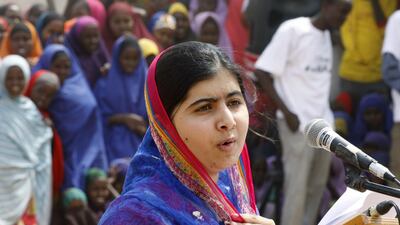DADAAB, Kenya // Nobel laureate Malala Yousafzai spent her 19th birthday on Tuesday visiting the world’s largest refugee camp to draw attention to the global refugee crisis.
It came as the Dadaab camp faces pressure to close after a quarter of a century.
Since last year, Ms Yousafzai has been in contact via Skype with a group of girls in Dadaab and was looking forward to meeting them and others, said Taylor Royle, her spokesman.
“I am here to speak for my unheard sisters of Somalia striving for education every day,” Ms Yousafzai said on Tuesday, explaining that on each birthday she chooses a region where girls’ education is neglected and needs attention.
Kenya’s government says the Dadaab camp, which hosts more than 300,000 mostly Somali refugees, will be closed in the next year because it has become a security liability. The camp is in eastern Kenya, near its border with Somalia.
The possibility that the camp will be closed brings yet more uncertainty to the refugees, who face the prospect of returning to a Somalia still plagued with conflict. Kenya insists that any returns will be voluntary, but the international community has urged caution and warned against forceful evictions.
Kenyan president Uhuru Kenyatta has said that repatriations from Dadaab will be done in a humane way.
Many of Dadaab’s refugees have lived most – if not all – their lives in the sprawling camp, which has been open for 25 years and is a vast settlement of established homes and newcomers’ improvised huts of thorn branches and other materials.
Ms Yousafzai was expected to be asked about the fate of Dadaab during her visit. She won the 2014 Nobel Peace Prize after militants shot her in 2012 while she was returning home from school in Pakistan, where she was an outspoken advocate for girls’ education in a highly conservative culture. She now lives in Britain with her family.
The Kenyan government claims that attacks on Kenya by the Somali-based extremist group Al Shabab were planned and facilitated in the Dadaab camp. Al Shabab has carried out numerous attacks in Kenya that have killed scores since 2011, when Kenya deployed troops to Somalia against the militants. Kenyan troops are now part of an African Union peacekeeping force there.
Al Shabab, which is linked to Al Qaeda, has vowed to continue attacking Kenya.
* Associated Press

